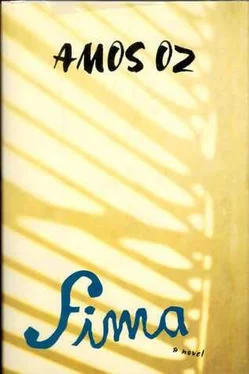We've had another power cut. The lights came on again after a couple of minutes. It's probably a hint to me that I ought to pop into the bank to pay my bill, otherwise they'll cut me off and leave me sitting in the dark. I owe the grocer a lot of money too. And did I pay Mrs. Schneider across the road for her schnitzel yesterday, or did I sign for it again? I forgot to get that book for Dimi. What's holding us up? Why are we still here? Why aren't we getting up and clearing out, and leaving Jerusalem to those who will come after us? A very good question, he said under his breath.
This time he convened his cabinet in the old Sha'arei Zedek hospital on Jaffa Road, a splendid abandoned building that had fallen into decay since the hospital was moved to a new site. By lamplight, among remnants of broken benches and pieces of rusting bedsteads, he arranged his ministers in a semicircle. He asked each of them in turn for a briefing on the situation in their various departments. Then he stunned them all by announcing that he intended to fly to Tunis at dawn to address the Palestine National Council. He would place the main burden of historic responsibility for the plight of the Palestinian Arabs fairly and squarely on the shoulders of their extremist leadership since the 'twenties. He would not spare them our anger. However, he would offer to break out of the vicious circle of bloodshed and start building together a reasonable future based on compromise and conciliation. The only condition for starting to negotiate would be the total cessation of violence on both sides. At the close of the session, in the early hours, he appointed Uri Gefen minister of defense. Gad Eitan received the foreign-affairs portfolio. Tsvi would be responsible for education, Nina for finance, Wahrhaftig was put in charge of social welfare, and Ted and Yael would look after science, technology, and energy. For information and internal security he was retaining himself for the time being. And from now on the cabinet would be renamed the Revolutionary Council. The revolutionary process would be completed within six months. By then peace would be established. And immediately thereafter we can all return to our occupations and no longer interfere in the work of the elected government. I myself shall withdraw into total anonymity. I shall change my name and disappear. Now let us disperse separately by side entrances.
What about involving Dimi?
During the winter holidays the child spent a morning in the laboratory at the cosmetics factory in Romema. When Fima arrived to take him to the Biblical Zoo, he found that the old man had shut himself up in the lab with the child and taught him how to use acetone to manufacture explosives. Fima was furious with his father for corrupting the child: Haven't we got enough murderers already? Why poison his soul? But Dimi interrupted the argument by observing gently, like a mediator:
"Granpa's explosives are only good for painting fingernails."
And they all burst out laughing.
On the wall to the left of the window, about four feet away, in a corner of a patch of peeling plaster, Fima saw a gray lizard, immobile, staring like himself, longingly, toward the Bethlehem hills. Or else watching a fly that was invisible to Fima. Once upon a time, on those hills and in their winding valleys, there wandered judges and kings, conquerors, prophets of consolation and wrath, world-reforming saviors, impostors, dreamers, priests and hearers of voices, traitors, messiahs, Roman prefects, Byzantine governors, Muslim generals, and crusader princes, and ascetics, hermits, wonderworkers, and sufferers . To this day Jerusalem still resounds with their memory in the ringing of its church bells, sobs out their names from the tops of its minarets, and conjures them back with cabbalistic incantations. And now, at this moment, there was, it seemed, not a living soul left in the city, bar himself and the lizard and the light.
When he was younger he too used to fancy he could hear a voice as he walked among Jerusalem's alleys and boulder-strewn waste plots. He even tried to record in words what he fancied he had heard. In those days he might still have been able to stir some hearts. Even now he could sometimes fascinate a few souls, particularly women, in those Friday-night get-togethers at the Tobiases' or the Gefens'. Sometimes he would throw out a dazzling idea, and for an instant the whole room would hold its breath. His ideas would then make their way around by word of mouth, and occasionally they even reached the columns of the newspapers. Sometimes, when the spirit moved him, he managed to coin a new phrase, to formulate a perception of die situation in words that had not previously been used, to utter some penetrating aperçu which circulated in the city until he came across it a few days later on the radio, severed from him and his name, and often distorted. His friends enjoyed reminding him, as a sort of mild rebuke, how once or twice he had shown real foresight, as for example in 'seventy-three, when he had gone around lamenting to the point of ridicule the blindness that was afflicting Israel, the impending catastrophe. Or on the eve of the invasion of Lebanon. Or before the wave of Islamic fundamentalism. Whenever his friends reminded him of these prophecies, Fima would recoil and reply with a rueful grin that it was nothing, the writing was already on the wall and any child could read it.
Tsvi Kropotkin sometimes copied pieces for him from a literary supplement or a periodical that made reference to the Death of Augustine , when some critics bothered to drag those poems out of oblivion to use them as additional ammunition in a campaign for or against current trends in poetry. Fima would shrug and mutter, That's enough, Tsvika, just drop it. His poems, like his prophecies, seemed to him remote and irrelevant. Why does the soul pine when it has no idea what it is pining for? What really exists and what only seems to exist? Where can you look for something lost when you have forgotten what it is you lost? Once, in his billy-goat year, during his brief marriage to the hotel owner in Valletta, he was sitting in a waterfront café in the harbor watching a couple of fishermen play backgammon. In point of fact it was not so much the fishermen he was watching as a German shepherd that sat, panting, on a chair between them. The dog's ears were pricked forward earnestly, as though it were listening for the next move, and it kept following the players' fingers and the rolls of the dice and the moving counters with eyes that seemed to Fima full of fascination and humble wonderment. Fima had never, before or since, seen such a concentrated effort to understand the unintelligible, as if in its longing to decipher the game the dog had achieved a degree of disembodiment. Surely that is precisely the way we ought to look at what is beyond us. To grasp as much as we can, or at least to grasp our inability to grasp. Fima sometimes pictured the creator of the universe, in whom he did not entirely believe, in the form of a Jerusalem tradesman of Middle Eastern origin, aged about sixty, lean and tanned and wrinkled, eaten away by cigarettes and arak, in threadbare brown trousers and a not very clean white shirt buttoned right up to the skinny neck but without a tie, and with worn-out brown shoes and a shabby old-fashioned jacket a little too small for him. This creator sat drowsily on a wicker stool, facing the sun, his eyes half-closed, his head sunk on his chest, in the doorway of his haberdashery shop in Zichron Moshe. A dead cigarette end hung from his lower lip and a string of amber beads hung frozen between his fingers, where a broad ring flashed from time to time. Fima stopped and dared to address him, with exaggerated politeness, in the third person, hesitantly: Might I be permitted to disturb Your Worship with just one question? A twitch of irony flitted across the wrinkled, leathery face. Perhaps just a fly buzzing? Would Your Worship deign to consider the Brothers Karamazov? The argument between Ivan and the Devil? Mitya's dream? Or the episode of the Grand Inquisitor? No? And what would Your Worship deign to reply to that question? Vanity of vanities? Would Your Worship resort yet again to the old arguments: Where wast thou when I laid the foundation of the world? I am that I am. The old man released a kind of belch reeking of tobacco and arak, turned up his two palms, which were as pitted as a plasterer's, and spread them empty on his knees. Only the ring on his finger glimmered for a moment and then faded. Was he chewing something? Smiling? Dozing? Fima abandoned his quest. Apologizing, he went on his way. Not running, not hurrying, yet nevertheless like one who runs away and knows he runs away, and also knows that running away is useless.
Читать дальше












